Automation, Capitalism and the End of the Middle Class: Routledge Focus on Economics and Finance
Autor Jon-Arild Johannessenen Limba Engleză Hardback – 30 apr 2019
Johannessen outlines the three elements – Balkanization, the Great Illusion, and the plutocracy – which are referred to here as feudal structures. He describes, analyzes, and discusses these elements both individually and in interaction with each other, and asks: "What structures and processes are promoting and boosting feudal capitalism?" Additionally, the book serves to generate knowledge about how the middle class will develop in the Fourth Industrial Revolution. It shows the various effects of robotization on the middle class, where middle class jobs are transformed, deconstructed, and re-constructed and new part-time jobs are created for the middle class.
Given the interest in the Fourth Industrial Revolution, the book will appeal to students of economic sociology and political economy as well as those in innovation and knowledge management courses focusing upon the emerging innovation economy. The topic will attract policymakers, and the accessible and engaging tone will also make the book of interest to the general public.
| Toate formatele și edițiile | Preț | Express |
|---|---|---|
| Paperback (1) | 185.02 lei 6-8 săpt. | |
| Taylor & Francis – 30 iun 2021 | 185.02 lei 6-8 săpt. | |
| Hardback (1) | 460.69 lei 6-8 săpt. | |
| Taylor & Francis – 30 apr 2019 | 460.69 lei 6-8 săpt. |
Din seria Routledge Focus on Economics and Finance
-
 Preț: 152.30 lei
Preț: 152.30 lei - 8%
 Preț: 388.78 lei
Preț: 388.78 lei -
 Preț: 155.44 lei
Preț: 155.44 lei -
 Preț: 174.74 lei
Preț: 174.74 lei - 8%
 Preț: 391.83 lei
Preț: 391.83 lei -
 Preț: 392.55 lei
Preț: 392.55 lei - 8%
 Preț: 389.99 lei
Preț: 389.99 lei -
 Preț: 167.37 lei
Preț: 167.37 lei -
 Preț: 386.43 lei
Preț: 386.43 lei - 8%
 Preț: 383.57 lei
Preț: 383.57 lei -
 Preț: 152.67 lei
Preț: 152.67 lei -
 Preț: 155.44 lei
Preț: 155.44 lei -
 Preț: 185.56 lei
Preț: 185.56 lei -
 Preț: 186.71 lei
Preț: 186.71 lei -
 Preț: 187.09 lei
Preț: 187.09 lei -
 Preț: 206.25 lei
Preț: 206.25 lei -
 Preț: 185.56 lei
Preț: 185.56 lei -
 Preț: 185.02 lei
Preț: 185.02 lei -
 Preț: 430.00 lei
Preț: 430.00 lei -
 Preț: 185.94 lei
Preț: 185.94 lei - 13%
 Preț: 337.00 lei
Preț: 337.00 lei -
 Preț: 152.30 lei
Preț: 152.30 lei - 15%
 Preț: 452.84 lei
Preț: 452.84 lei -
 Preț: 460.69 lei
Preț: 460.69 lei -
 Preț: 187.52 lei
Preț: 187.52 lei - 20%
 Preț: 159.00 lei
Preț: 159.00 lei -
 Preț: 462.63 lei
Preț: 462.63 lei -
 Preț: 192.31 lei
Preț: 192.31 lei -
 Preț: 186.14 lei
Preț: 186.14 lei -
 Preț: 201.39 lei
Preț: 201.39 lei -
 Preț: 469.38 lei
Preț: 469.38 lei -
 Preț: 385.07 lei
Preț: 385.07 lei -
 Preț: 460.69 lei
Preț: 460.69 lei
Preț: 460.69 lei
Nou
Puncte Express: 691
Preț estimativ în valută:
88.15€ • 92.05$ • 72.79£
88.15€ • 92.05$ • 72.79£
Carte tipărită la comandă
Livrare economică 15-29 aprilie
Preluare comenzi: 021 569.72.76
Specificații
ISBN-13: 9780367257248
ISBN-10: 0367257246
Pagini: 82
Ilustrații: 11 Line drawings, black and white; 11 Illustrations, black and white
Dimensiuni: 156 x 234 x 6 mm
Greutate: 0.25 kg
Ediția:1
Editura: Taylor & Francis
Colecția Routledge
Seria Routledge Focus on Economics and Finance
Locul publicării:Oxford, United Kingdom
ISBN-10: 0367257246
Pagini: 82
Ilustrații: 11 Line drawings, black and white; 11 Illustrations, black and white
Dimensiuni: 156 x 234 x 6 mm
Greutate: 0.25 kg
Ediția:1
Editura: Taylor & Francis
Colecția Routledge
Seria Routledge Focus on Economics and Finance
Locul publicării:Oxford, United Kingdom
Public țintă
Postgraduate and UndergraduateCuprins
Prologue 1. Lords and peasants in the Fourth Industrial Revolution 2. Robotization and the dissolution of the middle class 3. "Men in suits" are promoting extreme economic inequality Appendix: Historical account of the use of the term “feudal capitalism"
Notă biografică
Jon-Arild Johannessen holds a Master of Science from Oslo University in History and a Ph.D. from Stockholm University in Systemic Thinking. He is currently professor (full) in Leadership at Kristiania University College, Oslo, and Nord University, Norway. He has been professor (full) in Innovation at Syd-Danske University, Denmark, and professor (full) in Management at The Arctic University, Norway. At Bodø Graduate School of Business, Norway, he had a professorship (full) in Information Management, and he has also been a professor in Knowledge Management at the Norwegian School of Management.
Descriere
The author argues that a new form of capitalism is emerging at the threshold of the Fourth Industrial Revolution. He asserts that we are facing a transition from democratic capitalism to feudal capitalism and highlights how robotization and innovation is leading to a social crisis for the middle classes as economic inequality rises.
